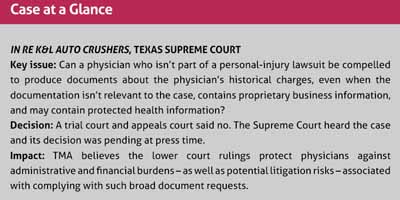
When Andrew Indresano, MD, got a subpoena in January 2019, he found it “a little shocking” and “really invasive.”
The Fort Worth orthopedic surgeon wasn’t even part of the personal-injury lawsuit for which he was being asked to produce a backward-looking swath of documents. But he had treated and performed surgery on a man who had sued an auto-recycling company and one of its drivers over a 2016 vehicle accident. Those defendants subsequently wanted information on the man’s medical care and the charges he’d incurred.
In front of Dr. Indresano – as he recalled two years later – was a 10- to 12-page document seeking dozens of categories of information, including documentation on his billing and payments from both commercial and government insurers – not just for the man in the accident, but for other patients as well. In some cases, the subpoena demanded information going back 10 years when Dr. Indresano hadn’t been in practice that long.
“I don’t do a ton of [personal injury] work, but I do see and get subpoenas at least every once in awhile – and I guess I’d never seen anything like that,” he told Texas Medicine. “I was kind of blown away. I didn’t know what to do.”
Thus began an offshoot saga of the Dallas personal injury case, one in which Dr. Indresano and two medical centers – also not parties in the lawsuit – pushed back against large-mouthed subpoena requests from the vehicle recycler, K&L Auto Crushers.
So far, two Texas courts have decided in favor of Dr. Indresano and the two facilities, who argued that the subpoena requests were overly broad and burdensome and would require turning over trade secrets, not to mention introducing potential HIPAA violations over protected health information.
The case is now before the Texas Supreme Court, where the Texas Medical Association and Texas Hospital Association (THA) filed a friend-of-the-court brief warning that allowing such overly broad and burdensome subpoena requests may deter physicians from providing services to patients involved in personal-injury cases.
Other organizations also filed briefs in support of Dr. Indresano and the hospitals, including the Texas Orthopaedic Association.

Give up the documents
In Dallas in December 2016, Kevin Walker and Latunija Johnson were in a vehicle accident with an 18-wheeler tractor-trailer owned by K&L Auto Crushers and driven by Thomas Gothard, Jr., legal records show. Five months after the accident, Dr. Indresano performed cervical spine surgery on Mr. Walker at Saint Camillus Medical Center. Mr. Walker also underwent shoulder surgery at Pine Creek Medical Center.
Mr. Walker received his treatment under letters of protection, which promise payment from a future lawsuit award or settlement. Mr. Walker and Ms. Johnson later filed a personal-injury suit against K&L and the driver, with Mr. Walker seeking payment for his medical expenses.
Challenging whether those expenses were reasonable, K&L and its driver, Mr. Gothard, subpoenaed Dr. Indresano and the two medical facilities, attempting to find out Mr. Walker’s “medical providers’ reimbursement rates with private insurers and Medicare/Medicaid, and the actual cost of the medical equipment and devices marked up in the providers’ bills,” court documents say. They requested “between 54 and 75 separate categories of additional documents,” including:
- The amounts Dr. Indresano and the facilities charged private insurers “for the services and materials listed in the providers’ bills” going back 10 years;
- The amounts they charged federal insurance programs for those services going back 10 years;
- Amounts billed “to the medical providers or paid by them to the manufacturers, sellers, and distributors of the materials/devices” they charged for as part of the care; and
- Ten years of documents relevant to amounts Dr. Indresano and the facilities charged to self-pay patients for the services and devices they also provided to Mr. Walker.
Martin Futrell and Amy Witherite, personal-injury attorneys for Mr. Walker, told Texas Medicine document requests like this one are becoming a more regular occurrence.
“I think we’re getting [them] at a minimum weekly, and maybe I shouldn’t be so bold to say daily, but it has become a cottage industry,” Ms. Witherite said. “And with that, not only are we lawyers for a party having to try and help them protect doctors, but doctors are routinely now having to hire attorneys to help fight these onerous requests.”
“Unduly burdensome”
The two medical centers and Dr. Indresano argued in court documents that the subpoenas were “overly broad, unduly burdensome, and sought irrelevant and confidential information.”
A Dallas district court agreed, rejecting the subpoenas.
K&L Auto Crushers tried its luck with a narrower document request but was denied again in the trial court and the Fifth Court of Appeals. So K&L went to the Texas Supreme Court, arguing that denying the subpoenas “severely” compromised the company’s ability to contest whether the medical expenses were reasonable.
The requests “do not on their faces seek confidential patient information and, in any event, [K&L has] repeatedly disavowed any intent to seek such information,” K&L’s court filings say, adding that the people who brought the suit “want this case to be a swearing match between experts in which the jury is denied access to relevant data … that would allow the jury to evaluate the expert testimony.”
An attorney for K&L Auto Crushers and the driver declined comment for this story on behalf of his clients.
Dr. Indresano and the medical centers said in their court documents that the state Supreme Court has taken a stand against “fishing expeditions” during pre-trial collecting of evidence, but K&L and its driver “do not just want to fish; instead, they ask this Court for permission to dredge the entire ocean, seeking to discover invasive and wholly irrelevant information regarding a plaintiff’s nonparty medical providers’ confidential reimbursement rates with private health insurance providers, agreements and communications with medical equipment companies, and other private information regarding their internal business practices.”
If K&L’s subpoena request is successful, “potentially every defendant in every personal injury case where the reasonableness of a plaintiff’s medical charges is at issue” will have access to a health care practitioner’s business information, Dr. Indresano told the Supreme Court in legal filings. “Ultimately, medical charges are either reasonable, or they are not; medical care is either necessary, or it is not. … Texas courts have had procedures in place for decades for personal injury defendants who wish to challenge those issues. Defense experts like those hired by [K&L and Mr. Gothard] have access to multiple payment schedules and do not need the payment rate from other sources to opine about a reasonable range for medical care expenses.”
In their friend-of-the-court brief, TMA and THA agreed with Dr. Indresano and the hospitals, saying the document request “threatens to subject nonparty physicians and medical providers to unfettered discovery requests, unreasonably increasing their burden.”
That burden includes administrative resources and time to dig up the requested information; potentially forcing the release of proprietary and confidential contract information; increased costs and risks that come with redacting patients’ protected health information; and the legal costs of reviewing the documents to ensure compliance with both the subpoena requests and the law.
“This may deter physicians and medical providers from providing services to patients involved in personal injury lawsuits, which will place additional burdens on the patients to find access to needed care,” TMA wrote.
Fulfilling the subpoena request would take “countless hours of work” for Dr. Indresano’s office, which has two practitioners and around 11 to 14 staff members at any given time, he said.
“If this even remotely became the expectation for physicians who happened to see a case that was in litigation, I just think it’s going to become more and more difficult to find doctors.”
The Supreme Court heard oral arguments in the case Jan. 5. At press time a decision was still pending.
Tex Med. 2020;117(3):44-46
March 2021 Texas Medicine Contents
Texas Medicine Main Page